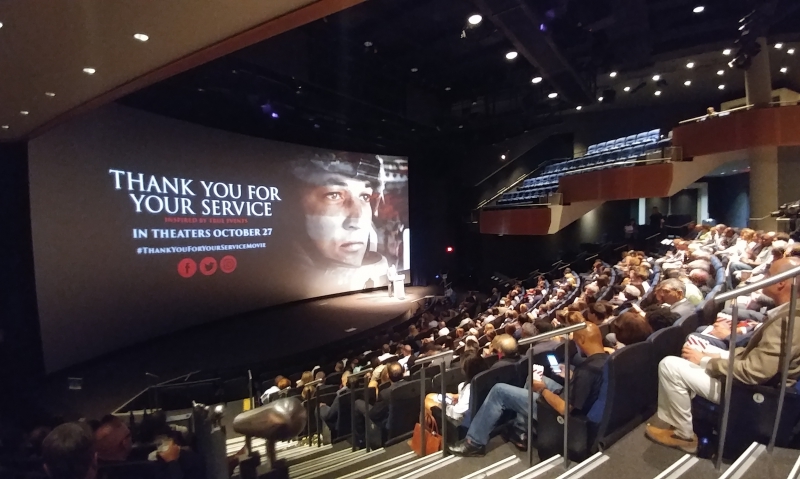
National commander views special screening of ‘Thank You for Your Service’
American Legion National Commander Denise H. Rohan joined more than 100 guests at the Newseum on Oct. 2 in Washington, D.C., for a special screening of Comcast NBCUniversal’s unreleased movie, "Thank You for Your Service," and a follow-up panel discussion about its significance in today’s society.
The movie, which will hit theaters Oct. 27, is a war drama that chronicles the lives of four Army soldiers as they struggle with transitioning back into civilian life upon returning home from war in Iraq. Having adapted the script from David Finkel’s 2013 bestselling book, screenwriter and director Jason Hall depicts a powerful picture of how detrimental post-traumatic stress disorder (PTSD) can be for servicemembers who deal with unforgiving memories and harsh realities that threaten to destroy the happy life they once knew.
“The movie was powerful. As I watched it, I was reminded of what not only our veterans go through but also their families,” Rohan said. “That’s what the American Legion Family is all about – getting together and having those discussions and knowing that veterans need to talk to someone.”
American actor Miles Teller plays a soldier named Adam Schumann who is reunited with his wife and two small children following a grueling tour in Iraq. Although he tries to undo the psychological damage by searching for happiness with family and friends, Schumann is scarred by deep remorse after saving a fellow soldier whom he accidentally dropped down a stairway while fleeing from enemy fire.
In one scene, Schumann and one of his battle buddies visit a VA hospital where they observe the harsh reality of life after war. The camera bounces from one close-up shot to another as dozens of sick and injured veterans are shown in a crowded room, waiting for their number to be called.
When Schumann is called to the counter, he was surprised to learn that requesting a VA card is not that simple just because he’s a veteran. The VA representative gives Schumann a benefits folder with a stack of paperwork inside, explaining how the eligibility process works and that there is a long wait time before a veteran can be seen or treated.
“VA employees care so much about veterans and that was depicted in the movie,” Rohan said. “The American Legion staunchly believes that VA is a system worth saving, but that there are certain areas that definitely must improve and this movie points that out.”
Schumann expressed his frustration and argued that veterans deserve better. He even pointed out the friend who was there with him, telling the VA employee that it’s veterans like them that sacrificed so much to get very little in return.
“When I think about being a member of The American Legion and all of the work that we do, it really is about taking care of each other,” Rohan said. “We have service officers across the country who are there to help veterans get the benefits they need and deserve. I wish they would have put that in the movie or mentioned that veterans can join a veterans service organization and talk to someone to see if that makes a difference. I’d like to think it would.”
Unaware of the demons and guilty feelings that he is battling, Schumann’s wife, Saskia, continues to live in blissful ignorance as she tries to help him transition back to family life. It wasn’t until a night alone that Saskia saw firsthand her husband’s mental illness – an intimate moment they shared was disrupted by a flashback of Adam watching his battle buddy’s head bust open after he fell out of his arms.
Saskia, fed up with her husband’s lack of transparency, tells Schumann that she wants to go to the VA with him and speak with an adviser. During a vulnerable scene, Schumann is shown crying as he relives the tragic moment he accidentally dropped his battle buddy. He later reveals the Army honored him, with two commendation medals and an achievement medal, for his heroic efforts in saving his friend who survived the encounter.
“We have so many veterans who are silently suffering. Unless you know them personally, you may or may not know about what’s going on inside their head,” Rohan said. “As veterans identify themselves, I’m hoping people actually take the time to stop and actually listen to their stories. Listening to one another may make a difference in their lives.”
The movie also showed what real sacrifice is like for military families whose once happy lives are destroyed by war. Another one of Schumann’s battle buddies was devastated to return home from war after discovering that his wife took their child and left with no explanation.
He eventually found out, after visiting his wife at her job, that she was upset about him going to war and leaving their family behind. Unwilling to accept the fact that he just wanted to provide a better life for her and their daughter, she told him their relationship is over and there was no chance of them being a family again. He then pointed a gun at his head and shot himself right before her eyes.
“To think about the fact that from the time I got up this morning until the time I go to bed tonight, 20 veterans would have given up hope and committed suicide. That’s just unimaginable to me,” Rohan said. “The American Legion believes in creating a sense of family for our veterans. I have no doubt that we will continue to step up, invite all veterans to our Legion post homes, pay attention and take the time to really get to know our veterans as they share their stories.”
